Workshop Description
The INL Wireless Security Institute advances and focuses national research efforts on challenges associated with the secure use of 5G (and beyond) and related spectrum. This workshop will focus on the security and resilience of 5G: devices and networks, cellular drone operation, and spectrum sharing. It will build on the output of the first workshop held in February 2020 where an invited group of wireless security researchers and leaders from U.S. government agencies, universities, and industry identified the critical 5G security challenges facing the nation.
Workshop Details
WHEN:
Tuesday, November 17, 2020
8AM-4PM MST
(10AM-6PM EST)
Wednesday, November 18, 2020 (U.S. Citizens Only)
8:30AM-1:45PM MST
(10:30AM-3:30PM EST)
WHERE:
Virtual online event
Once registration is confirmed, virtual links
and information will follow.
OTHER:
Previous Wireless Workshop
Salt Lake City, February 2020
REGISTRATION INFORMATION
Registration for Day 1 (Workshop)
Registration for Day 1 (Virtual Tours)
Registration has closed.
Speakers
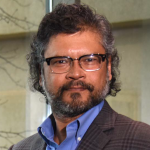 Dr. Arupjyoti (Arup) Bhuyan is a wireless researcher in the Idaho National Laboratory (INL) and the Technical Director of the INL Wireless Security Institute. The focus of his research is on secure implementation of future generations of wireless communications with scientific exploration and engineering innovations across the fields of wireless technology, cybersecurity, and computational science. Specific goals are to assure communications among critical infrastructure systems supporting control of the electric grid, emergency response, and nationwide unmanned aerial systems. Arup has extensive industry experience in wireless communications from his work before he joined INL in October, 2015. He received his Ph.D. in Engineering and Applied Sciences from Yale University. He is a senior member of IEEE.
Dr. Arupjyoti (Arup) Bhuyan is a wireless researcher in the Idaho National Laboratory (INL) and the Technical Director of the INL Wireless Security Institute. The focus of his research is on secure implementation of future generations of wireless communications with scientific exploration and engineering innovations across the fields of wireless technology, cybersecurity, and computational science. Specific goals are to assure communications among critical infrastructure systems supporting control of the electric grid, emergency response, and nationwide unmanned aerial systems. Arup has extensive industry experience in wireless communications from his work before he joined INL in October, 2015. He received his Ph.D. in Engineering and Applied Sciences from Yale University. He is a senior member of IEEE.

Dan Elmore is the Director of the Critical Infrastructure Security & Resilience division in the National & Homeland Security directorate at the Idaho National Laboratory. He also serves as the Executive Director of the INL Wireless Security Institute. Mr. Elmore provides strategic leadership in support of the research, development, and deployment of engineered solutions to protect the nation’s critical infrastructure. Significant focus areas for his organization are resilient control systems, electric power grid security, spectrum sharing, and wireless communications challenges targeted at large infrastructure, as well as military systems and platforms. Mr. Elmore has been a senior leader on INL’s national security team since 2013.
Mr. Elmore is a retired Air Force colonel with more than 27 years of active duty military experience leading organizations comprised of military, civilian, and contractor teams performing cyber operations support, communications systems, and networks engineering, national and nuclear command and control systems operations, and Continuity of Government and contingency operations planning. His last active duty assignment was at the Pentagon where he directed the largest single cyberspace office in Air Force Headquarters.
Prior to the Pentagon, Mr. Elmore served in a variety of positions and locations, including the White House, U.S. Strategic Command, Alaska, Saudi Arabia, and Afghanistan. His extensive operational experience, coupled with a fundamental knowledge of critical infrastructure and its relationship to mission assurance, exposure to the inner workings of federal and intelligence agencies, as well as broad exposure to specialized and classified capabilities, helps to advance National & Homeland Security programs.
Mr. Elmore attained his Bachelor’s degree in Electrical Engineering from Michigan Technological University, Master’s degree in Systems Technology from the Naval Postgraduate School, and Master’s degree in Computer & Information Resources Management from Webster University. He is a Life Member of the Air Force Association, Life Member of the Armed Forces Communications Electronics Association, and a Senior Member of the Institute for Electrical & Electronics Engineers.
 Rocky Campione was selected in July 2019 to serve as Chief Information Officer (CIO) for the Department of Energy (DOE). In this position, he oversees the Department’s information technology (IT) portfolio, serves as an advisor to the Deputy Secretary and Secretary, and leads and manages the various functions within the Office of the Chief Information Officer. Mr. Campione has extensive experience with managing and implementing IT and cybersecurity solutions in executive roles across both the Federal Government, as well as in corporate leadership roles in the private sector. In addition to his work at DOE and outside of government in the IT industry, Mr. Campione has held a number of other positions at the Department of State and within the Legislative Branch. A graduate of Syracuse University, Mr. Campione graduated with Bachelor of Arts degrees in Political Science and History, and he has a Master of Science degree from George Mason University in Technology Management. He lives in Alexandria, VA with his wife and four children.
Rocky Campione was selected in July 2019 to serve as Chief Information Officer (CIO) for the Department of Energy (DOE). In this position, he oversees the Department’s information technology (IT) portfolio, serves as an advisor to the Deputy Secretary and Secretary, and leads and manages the various functions within the Office of the Chief Information Officer. Mr. Campione has extensive experience with managing and implementing IT and cybersecurity solutions in executive roles across both the Federal Government, as well as in corporate leadership roles in the private sector. In addition to his work at DOE and outside of government in the IT industry, Mr. Campione has held a number of other positions at the Department of State and within the Legislative Branch. A graduate of Syracuse University, Mr. Campione graduated with Bachelor of Arts degrees in Political Science and History, and he has a Master of Science degree from George Mason University in Technology Management. He lives in Alexandria, VA with his wife and four children.
 Eric Burger serves as Assistant Director for the White House Office of Science and Technology Policy (OSTP). In this role, he is responsible for the telecommunications and cybersecurity portfolios.
Eric Burger serves as Assistant Director for the White House Office of Science and Technology Policy (OSTP). In this role, he is responsible for the telecommunications and cybersecurity portfolios.
Dr. Burger is a former Chief Technology Officer with the FCC and a Research Professor of Computer Science at Georgetown University. Prior to academia he started and turned around a number of public and private network equipment companies. He has an SBEE, MBA, and PhD in Computer Science from the Massachusetts Institute of Technology, Katholieke Universiteit Leuven, and Illinois Institute of Technology.
 Daniel Kroese is CISA’s Deputy Assistant Director (A) for National Risk Management. In his leadership role within the NRMC and CISA, he focuses significant effort on public-private partnerships to enhance cybersecurity and infrastructure resilience. At the NRMC he has been actively involved in information and communications technology supply chain risk management efforts, 5G security and resilience initiatives, and the launch of the National Critical Functions construct to evolve understanding of cross-cutting risk to critical infrastructure. Prior to joining the NRMC, Daniel was Senior Advisor to Director Krebs at CISA. Daniel previously served as Chief of Staff to Congressman John Ratcliffe who chaired the Cybersecurity and Infrastructure Protection Subcommittee in the House of Representatives. Throughout these roles, Daniel has been on the front lines of important cybersecurity debates and has developed deep connections across industry and government alike.
Daniel Kroese is CISA’s Deputy Assistant Director (A) for National Risk Management. In his leadership role within the NRMC and CISA, he focuses significant effort on public-private partnerships to enhance cybersecurity and infrastructure resilience. At the NRMC he has been actively involved in information and communications technology supply chain risk management efforts, 5G security and resilience initiatives, and the launch of the National Critical Functions construct to evolve understanding of cross-cutting risk to critical infrastructure. Prior to joining the NRMC, Daniel was Senior Advisor to Director Krebs at CISA. Daniel previously served as Chief of Staff to Congressman John Ratcliffe who chaired the Cybersecurity and Infrastructure Protection Subcommittee in the House of Representatives. Throughout these roles, Daniel has been on the front lines of important cybersecurity debates and has developed deep connections across industry and government alike.
Daniel is a graduate of the University of Pennsylvania, and a native of Seattle, WA.
Michael J. “Apollo” Lovell is the Executive Director for Joint Base San Antonio’s Electromagnetic Defense Initiative and Fifth-Generation (5G) Communications Experimentation Site. He leads a task force with over 80 organizations and 350 volunteers for the largest Joint Base in DoD consisting of 11 installations, 266 mission partners, and 80,000 employees to harden utilities from Electromagnetic Pulse effects and implement 5th Generation Cellular technologies. In addition, Brigadier General Lovell is dual-hatted as the Mobilization Assistant to the Director of Intelligence, United States Strategic Command.
DoD recently selected JBSA as one of the bases where it will conduct 5G communications technology experimentation and testing. DoD’s efforts focus on large-scale experimentation and prototyping of dual-use (military and commercial) 5G technology that will provide high speeds, quicker response times and the ability to handle many more wireless devices than current wireless technology. JBSA’s primary focus in 5G experimentation is Augmented Reality Support of Medical Training and Telemedicine along with 5G Core Security Experimentation. With both Telemedicine and Core Security, JBSA is the largest experimentation site in DoD’s 5G portfolio.
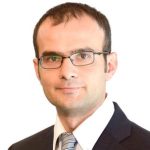 Ismail Guvenc (senior member, IEEE) received his Ph.D. degree in electrical engineering from University of South Florida in 2006. He was with Mitsubishi Electric Research Labs during 2005, with DOCOMO Innovations between 2006-2012, and with Florida International University between 2012-2016. Currently he is a Professor with the Department of Electrical and Computer Engineering at North Carolina State University. His recent research interests include 5G wireless systems, communications and networking with drones, and heterogeneous wireless networks. He has published more than 130 conference/journal papers and book chapters, and several standardization contributions. He co-authored/co-edited three books for Cambridge University Press, served as an editor for IEEE Communications Letters (2010-2015) and IEEE Wireless Communications Letters (2011-present), and as a guest editor for several other journals. Dr. Guvenc is an inventor/co-inventor some 30 U.S. patents. He is a recipient of the FIU College of Engineering Faculty Research Award (2016), NSF CAREER Award (2015), Ralph E. Powe Junior Faculty Enhancement Award (2014), and USF Outstanding Dissertation Award (2006).
Ismail Guvenc (senior member, IEEE) received his Ph.D. degree in electrical engineering from University of South Florida in 2006. He was with Mitsubishi Electric Research Labs during 2005, with DOCOMO Innovations between 2006-2012, and with Florida International University between 2012-2016. Currently he is a Professor with the Department of Electrical and Computer Engineering at North Carolina State University. His recent research interests include 5G wireless systems, communications and networking with drones, and heterogeneous wireless networks. He has published more than 130 conference/journal papers and book chapters, and several standardization contributions. He co-authored/co-edited three books for Cambridge University Press, served as an editor for IEEE Communications Letters (2010-2015) and IEEE Wireless Communications Letters (2011-present), and as a guest editor for several other journals. Dr. Guvenc is an inventor/co-inventor some 30 U.S. patents. He is a recipient of the FIU College of Engineering Faculty Research Award (2016), NSF CAREER Award (2015), Ralph E. Powe Junior Faculty Enhancement Award (2014), and USF Outstanding Dissertation Award (2006).
 Eric T. Ringer is co-founder and Director of Aviation Technology at Skyward, a Verizon company. In his role as Director of Aviation Technology he leads the effort to bring 4G LTE & 5G to low altitude aircraft, enabling the traffic services, fleet management, and business systems integration necessary to scale autonomous aircraft.
Eric T. Ringer is co-founder and Director of Aviation Technology at Skyward, a Verizon company. In his role as Director of Aviation Technology he leads the effort to bring 4G LTE & 5G to low altitude aircraft, enabling the traffic services, fleet management, and business systems integration necessary to scale autonomous aircraft.
Prior to Skyward, Eric was a systems engineer at contractors for both NASA and Sikorsky. He enjoys combining that experience with an MBA and BS in Mechanical Engineering to solve problems where engineering and business opportunities meet.
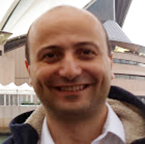 Kemal Akkaya is a full Professor in the Department of Electrical & Computer Engineering at Florida International University (FIU). I received my BS degree in Computer Science from Bilkent University, MS degree in Computer Engineering from Middle-East Technical University, Turkey and PhD in Computer Science from University of Maryland, Baltimore County (UMBC). He leads the Advanced Wireless and Security (ADWISE) Research Lab at FIU. Previously, I was an associate professor at Southern Illinois University, Carbondale, IL. His current research interests are: Secure Protocol Design, IoT Security, Cyber-physical System Security, PKI & Key Distribution, Blockchain Applications, IoT/CPS Forensics, SDN-based Defense, Privacy in Smart Grid, Privacy in Vehicular Networks, Privacy in Smart Buildings/Homes, Homomorphic Systems, Energy-Efficient Protocols, QoS Provisioning & Multimedia Processing, Node Placement, Coverage and Connectivity, Localization. Coexistence of standards.
Kemal Akkaya is a full Professor in the Department of Electrical & Computer Engineering at Florida International University (FIU). I received my BS degree in Computer Science from Bilkent University, MS degree in Computer Engineering from Middle-East Technical University, Turkey and PhD in Computer Science from University of Maryland, Baltimore County (UMBC). He leads the Advanced Wireless and Security (ADWISE) Research Lab at FIU. Previously, I was an associate professor at Southern Illinois University, Carbondale, IL. His current research interests are: Secure Protocol Design, IoT Security, Cyber-physical System Security, PKI & Key Distribution, Blockchain Applications, IoT/CPS Forensics, SDN-based Defense, Privacy in Smart Grid, Privacy in Vehicular Networks, Privacy in Smart Buildings/Homes, Homomorphic Systems, Energy-Efficient Protocols, QoS Provisioning & Multimedia Processing, Node Placement, Coverage and Connectivity, Localization. Coexistence of standards.
 Eyuphan Bulut is an Associate Professor in the CS department at the Virginia Commonwealth University. His responsibilities are teaching, research, service, and mentoring students. His research interests include mobile and pervasive computing, cyber-physical systems, social networks, wireless charging, cyber security, Internet of Things (IoT), device-free WiFi sensing, network data mining and learning.
Eyuphan Bulut is an Associate Professor in the CS department at the Virginia Commonwealth University. His responsibilities are teaching, research, service, and mentoring students. His research interests include mobile and pervasive computing, cyber-physical systems, social networks, wireless charging, cyber security, Internet of Things (IoT), device-free WiFi sensing, network data mining and learning.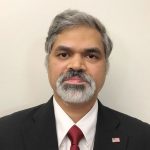 Sudhir B. Pattar is a Member of Technical Staff at InterDigital. Sudhir heads the Government Initiatives at InterDigital and has over 23+ years of work experience, during which he has led and managed multiple projects in wireless communication technologies such as 5G, LTE, 4G, 3G and new technologies such as artificial intelligence/machine learning, autonomous vehicles. Most recently, Sudhir was the lead investigator and co-PI on adopting 5G in mmWave band for Tactical Communications. In past, Sudhir has been a standards representative for InterDigital at ISO, SAE, ETSI and IEEE standards organizations and has made numerous contributions to the development of wireless standards, security standards and autonomous vehicle standards. Sudhir holds a Masters in Electrical Communication Engineering from Villanova University.
Sudhir B. Pattar is a Member of Technical Staff at InterDigital. Sudhir heads the Government Initiatives at InterDigital and has over 23+ years of work experience, during which he has led and managed multiple projects in wireless communication technologies such as 5G, LTE, 4G, 3G and new technologies such as artificial intelligence/machine learning, autonomous vehicles. Most recently, Sudhir was the lead investigator and co-PI on adopting 5G in mmWave band for Tactical Communications. In past, Sudhir has been a standards representative for InterDigital at ISO, SAE, ETSI and IEEE standards organizations and has made numerous contributions to the development of wireless standards, security standards and autonomous vehicle standards. Sudhir holds a Masters in Electrical Communication Engineering from Villanova University.
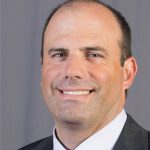 Robert W. Heath, Jr. joined the Department of Electrical and Computer Engineering at NC State in August 2020. From 2002 to 2020, he was with the University of Texas at Austin where he was involved in the leadership of their wireless group, and created an initiative to bring together communications, sensing, and machine learning. Dr. Heath is also President and CEO of MIMO Wireless Inc. His research has been extensively funded by industry and government.
Robert W. Heath, Jr. joined the Department of Electrical and Computer Engineering at NC State in August 2020. From 2002 to 2020, he was with the University of Texas at Austin where he was involved in the leadership of their wireless group, and created an initiative to bring together communications, sensing, and machine learning. Dr. Heath is also President and CEO of MIMO Wireless Inc. His research has been extensively funded by industry and government.
Dr. Heath’s research interests include wireless communications cellular systems, public safety, and military networks, with recent applications to vehicular communication systems, 5G, and now 6G. He has authored or co-authored several books including “Introduction to Wireless Digital Communication” (Prentice Hall, 2017), “Millimeter Wave Wireless Communications” (Prentice Hall, 2014) and “Foundations of MIMO Communication” (Cambridge University Press, 2019).
 Brian Kelley received his BSEE from Cornell University’s College of Electrical Engineering in Ithaca, NY, where he graduated Tau Beta Pi and Eta Kappa Nu. He received his MSEE and PhDEE from Georgia Tech in 1992 where he was an Office of Naval Research Fellow and a Georgia Tech Presidential Fellow with a research focus on communications, Signal Processing, and high performance computing architectures. Prior to joining the University of Texas at San Antonio, Dr. Kelley spent over 10 years in industry with both Motorola and Motorola’s spinoff, Freescale. While there, he rose to Distinguished Member of the Technical Staff, developing Wi-Fi, HSPA, LTE platforms, radio link simulators, and traveled around the world as a representative to the 3GPP(4G-LTE) standards body.
Brian Kelley received his BSEE from Cornell University’s College of Electrical Engineering in Ithaca, NY, where he graduated Tau Beta Pi and Eta Kappa Nu. He received his MSEE and PhDEE from Georgia Tech in 1992 where he was an Office of Naval Research Fellow and a Georgia Tech Presidential Fellow with a research focus on communications, Signal Processing, and high performance computing architectures. Prior to joining the University of Texas at San Antonio, Dr. Kelley spent over 10 years in industry with both Motorola and Motorola’s spinoff, Freescale. While there, he rose to Distinguished Member of the Technical Staff, developing Wi-Fi, HSPA, LTE platforms, radio link simulators, and traveled around the world as a representative to the 3GPP(4G-LTE) standards body.
Since 2007, Dr. Kelley has been an Associate Professor of Electrical and Computer Engineering at the University of Texas at San Antonio (UTSA). At UTSA, Dr. Kelley instructs courses on 5G- Communications, 4G Communications, Foundations of Communications, Internet of Things (IoT), Software Defined Radio (SDR), Error Correction Codes, and Statistics, Random Signals and Noise. At UTSA, Dr. Kelley is Director of the Wireless Information and Next Generation Systems Laboratory (WINGS) with an emphasis on 5G Communications, Software Defined Radio (SDR), Cloud Radio Access Network (CRAN). His current research involves securing IoT systems through the integration of Physical Layer Security and 5G. Dr. Kelley has received over $2.6M in research funding from ONR, AFRL TECHLAV, DoE and collaborates extensively with cellular communications companies. He has numerous IEEE publications and holds 11 U.S. patents. Dr. Kelley has been an IEEE 4G Technical Workshop Organizer, has served on the Technical Program Committee for IEEE Globecom, currently Chairs the IEEE Chapter of Communications and Signal Processing of San Antonio, and has been Associate Editor of the IEEE System Journal. From 2015-2016, Dr. Kelley was Sabbatical Employee of the Department of Defense in Washington D.C.; and in 2015 and 2017, he was a Summer Faculty Fellow at Oak Ridge National Laboratory (ORNL) in the Quantum Information System Group. In 2020, Dr. Kelley was selected Principal Investigator for DoDs 5G Core Network Security and 5G Telemedicine effort at the DoD-JBSA.
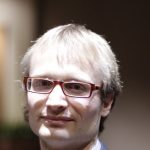 Vuk Marojevic is Associate Professor at Bagley College of Engineering, Mississippi State University and he has a Ph. D in Electrical and COmputer Engineering from Universitat Politecnica de Catalunya (Barcelona Tech).
Vuk Marojevic is Associate Professor at Bagley College of Engineering, Mississippi State University and he has a Ph. D in Electrical and COmputer Engineering from Universitat Politecnica de Catalunya (Barcelona Tech).
Dr. Marojevic received his M.S. degree from the University of Hannover, Germany, in electrical engineering. Prior to joining Mississippi State University he was with Wireless@Virginia Tech, where he built and managed Virginia Tech’s LTE and cognitive radio testbeds, among others. His research interests are in resource management, LTE, New Radio, V2X, physical layer security, spectrum sharing, software radios, millimeter wave communications, artificial intelligence, and wireless network virtualization with application to commercial communications and networking, mission-critical networks, and unmanned aircraft systems and autonomous and connected vehicles. His goals are to build a strong research program that addresses both fundamental and practical research questions, and to develop new tools for hands-on education.
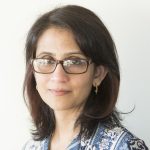 Monisha Ghosh is serving as the Chief Technology Officer (CTO) of the Federal Communications Commision (FCC) since Jan. 13, 2020. Prior to this, she was at NSF as a rotating Program Director since September 2017, in the Computer and Network System (CNS) division within the Directorate of Computer & Information Science and Engineering (CISE) where she managed wireless networking research within the Networking Technologies and Systems (NeTS) program. Dr. Ghosh is also a Research Professor at the University of Chicago, with a joint appointment at the Argonne National Laboratories, where she conducts research on wireless technologies for the IoT, 5G cellular, next generation Wi-Fi systems and spectrum coexistence. Prior to joining the University of Chicago in September 2015, she worked at Interdigital, Philips Research and Bell Laboratories, on various wireless systems such as the HDTV broadcast standard, cable standardization and on cognitive radio for the TV White Spaces. She has been an active contributor to many industry standards and is a Fellow of the IEEE.
Monisha Ghosh is serving as the Chief Technology Officer (CTO) of the Federal Communications Commision (FCC) since Jan. 13, 2020. Prior to this, she was at NSF as a rotating Program Director since September 2017, in the Computer and Network System (CNS) division within the Directorate of Computer & Information Science and Engineering (CISE) where she managed wireless networking research within the Networking Technologies and Systems (NeTS) program. Dr. Ghosh is also a Research Professor at the University of Chicago, with a joint appointment at the Argonne National Laboratories, where she conducts research on wireless technologies for the IoT, 5G cellular, next generation Wi-Fi systems and spectrum coexistence. Prior to joining the University of Chicago in September 2015, she worked at Interdigital, Philips Research and Bell Laboratories, on various wireless systems such as the HDTV broadcast standard, cable standardization and on cognitive radio for the TV White Spaces. She has been an active contributor to many industry standards and is a Fellow of the IEEE.
She received her Ph.D. in Electrical Engineering from the University of Southern California in 1991, and her B. Tech from the Indian Institute of Technology, Kharagpur (India) in 1986.
 David Debrecht has a diverse technology development background, including both telecom and defense industries. He has a served in a broad range of technology and product development roles, from R&D to new technology development, to architecture and solutions development. He is currently in the role of CTO for the United States sub-region for Nokia. In this position, David provides technology vision and leadership to both Nokia’s customer teams and directly to operators in a variety of markets, such as wireless and cable operators, Public Safety, and DOD/Government Projects. Since 2002, David has been directly engaged with operators in technology development for various 3GPP and IEEE based solutions, and focused on LTE market and solution development since 2009. David joined Nokia in 1995 as a Senior Radio Systems Engineer for their newly formed, US based R&D organization. Within three years of joining Nokia, David took on the role of Systems Department Manager, growing the organization to more than 100 engineers with systems, baseband, and SW development R&D capacities.
David Debrecht has a diverse technology development background, including both telecom and defense industries. He has a served in a broad range of technology and product development roles, from R&D to new technology development, to architecture and solutions development. He is currently in the role of CTO for the United States sub-region for Nokia. In this position, David provides technology vision and leadership to both Nokia’s customer teams and directly to operators in a variety of markets, such as wireless and cable operators, Public Safety, and DOD/Government Projects. Since 2002, David has been directly engaged with operators in technology development for various 3GPP and IEEE based solutions, and focused on LTE market and solution development since 2009. David joined Nokia in 1995 as a Senior Radio Systems Engineer for their newly formed, US based R&D organization. Within three years of joining Nokia, David took on the role of Systems Department Manager, growing the organization to more than 100 engineers with systems, baseband, and SW development R&D capacities.
David graduated from Texas A&M University with a degree in Electrical Engineering in 1989. He started his career at General Dynamics/Lockheed Martin in Ft Worth, where he worked on the F-16 development program. While there, he worked in the Radar Warning and Electronic Counter Measures group on both USAF and foreign military avionics system development and integration programs. David specialized in RF systems integration and compatibility design and verification.
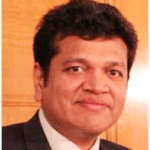 Sneha Kumar Kasera is Associate Dean for Academic Affairs, College of Engineering and a Professor, School of Computing the University of Utah. He is leading the Advanced Networked Systems Research (ANSR) Lab that he founded in 2003. Sneha’s research interests include: networks and systems – technologies, protocols and applications encompassing mobile and pervasive systems and wireless networks, security, privacy, and reliability, Internet of Things, crowdsourcing, dynamic spectrum access, network resource management, network measurements and models, and social network applications.
Sneha Kumar Kasera is Associate Dean for Academic Affairs, College of Engineering and a Professor, School of Computing the University of Utah. He is leading the Advanced Networked Systems Research (ANSR) Lab that he founded in 2003. Sneha’s research interests include: networks and systems – technologies, protocols and applications encompassing mobile and pervasive systems and wireless networks, security, privacy, and reliability, Internet of Things, crowdsourcing, dynamic spectrum access, network resource management, network measurements and models, and social network applications.
Recent Professional Activities:
- Program Co-chair – IEEE WoWMoM Symposium 2020
- Program Co-chair – ACM WiSec Conference 2017
- Program Co-chair – ACM MobiCom Conference 2015
- Steering Committee Member – IEEE SECON, 2012 – 2018
- Associate Editor – IEEE/ACM Transactions on Networking, 2011 – 2015
- Associate Editor – IEEE Transactions on Mobile Computing, 2009 – 2013
- Program Co-chair – IEEE ICNP 2011
- Program Co-chair – IEEE SECON 2011
 Mingyue Ji is an Assistant Professor of Electrical and Computer Engineering Department at University of Utah. He directs the Caching, Communication and Computing (C3) Lab in the ECE department. Dr. Ji received the Ph. D. degree from the Department of Electrical Engineering at University of Southern California in 2015. He subsequently was a Staff II System Design Scientist with Broadcom Corporation (Broadcom Limited), where he made a number of contributions for the standardization of the next generation of WLAN systems (802.11ax), in 2015-2016. He received the best paper award in IEEE International Conference on Communications (ICC) 2015, the best student paper award in IEEE European Wireless Conference 2010 and USC Annenberg Fellowship from 2010 to 2014. His main interests are in the field of communications and networking, information and coding theory, and statistics with particular focus on caching networks, next generation wireless communications, distributed storage and computing systems, and mobile ad hoc and sensor networks.
Mingyue Ji is an Assistant Professor of Electrical and Computer Engineering Department at University of Utah. He directs the Caching, Communication and Computing (C3) Lab in the ECE department. Dr. Ji received the Ph. D. degree from the Department of Electrical Engineering at University of Southern California in 2015. He subsequently was a Staff II System Design Scientist with Broadcom Corporation (Broadcom Limited), where he made a number of contributions for the standardization of the next generation of WLAN systems (802.11ax), in 2015-2016. He received the best paper award in IEEE International Conference on Communications (ICC) 2015, the best student paper award in IEEE European Wireless Conference 2010 and USC Annenberg Fellowship from 2010 to 2014. His main interests are in the field of communications and networking, information and coding theory, and statistics with particular focus on caching networks, next generation wireless communications, distributed storage and computing systems, and mobile ad hoc and sensor networks.
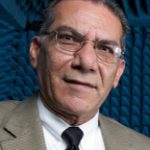 Hussein Moradi joined Idaho National Laboratory in November 2009. Dr. Moradi’s leadership and technical contributions as Chief Wireless Scientist and Technical Director of Spectrum Innovation have been programmatically transformative. Hussein has been issued nine U.S. and foreign patents, plus two additional patents pending. The majority of his patents are for his radio transceiver invention called Wireless Spectrum Communications (WSComm). This technology is based on Filter-bank Multi-carrier Spread Spectrum (FBMC-SS) that can communicate over a range of frequencies while decreasing interference with spectrum sensing technology. It can be leveraged to solve a host of national spectrum sharing challenges including robust communications within congested and contested RF environments while maintaining extremely low transmission power levels. Dr. Moradi was declared “The Inventor of the Year” in 2017-2018 by the Idaho National Laboratory and Battelle Energy Alliance. Dr. Moradi was the winner of 2012 R&D 100 Awards for his invention. Dr. Moradi brings to INL more than 30 years of experience in various elements of corporate R&D leadership.
Hussein Moradi joined Idaho National Laboratory in November 2009. Dr. Moradi’s leadership and technical contributions as Chief Wireless Scientist and Technical Director of Spectrum Innovation have been programmatically transformative. Hussein has been issued nine U.S. and foreign patents, plus two additional patents pending. The majority of his patents are for his radio transceiver invention called Wireless Spectrum Communications (WSComm). This technology is based on Filter-bank Multi-carrier Spread Spectrum (FBMC-SS) that can communicate over a range of frequencies while decreasing interference with spectrum sensing technology. It can be leveraged to solve a host of national spectrum sharing challenges including robust communications within congested and contested RF environments while maintaining extremely low transmission power levels. Dr. Moradi was declared “The Inventor of the Year” in 2017-2018 by the Idaho National Laboratory and Battelle Energy Alliance. Dr. Moradi was the winner of 2012 R&D 100 Awards for his invention. Dr. Moradi brings to INL more than 30 years of experience in various elements of corporate R&D leadership.
Dr. Moradi earned his Ph.D. and Masters degree from Southern Methodist University (SMU) Dallas, and his Bachelor Degree from University of Texas at Arlington (UTA); all of the degrees are in the EE discipline. He has been a member of the Board of Professional Engineers since the early 1990’s. Prior to joining INL, Dr. Moradi assumed lead R&D responsibly at NEC America, VeriFone and Kyocera.
 Rose Qingyang Hu is a Professor in the Department of Electrical and Computer Engineering. Prior to joining Utah State University, she held various industry and academia positions, actively participated in industry 4G standards/technology development and system level simulations. She was an Assistant Professor with the Electrical and Computer Engineering Department of Mississippi State University during 2002-2004. During 1998-2002 and during 2004-2010, she held several management and Senior research positions in telecommunication industry. Her current research interests include next generation (5G) wireless network, Internet of Things, cyber physical systems, design and optimization, simulation, modeling and performance evaluation. She has published about 230 journal and conference papers and holds over 30 patents in these areas. She is a Fellow of IEEE.
Rose Qingyang Hu is a Professor in the Department of Electrical and Computer Engineering. Prior to joining Utah State University, she held various industry and academia positions, actively participated in industry 4G standards/technology development and system level simulations. She was an Assistant Professor with the Electrical and Computer Engineering Department of Mississippi State University during 2002-2004. During 1998-2002 and during 2004-2010, she held several management and Senior research positions in telecommunication industry. Her current research interests include next generation (5G) wireless network, Internet of Things, cyber physical systems, design and optimization, simulation, modeling and performance evaluation. She has published about 230 journal and conference papers and holds over 30 patents in these areas. She is a Fellow of IEEE.
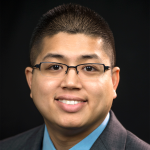 Vincent Sritapan is an (Acting) Section Chief in the Cybersecurity and Infrastructure Security Agency’s (CISA) Cyber Quality Service Management Office (QSMO). In this position, Vincent is leading the development and delivery of mobile security services and capabilities to help protect government networks. As Acting Section Chief in the Cybersecurity QSMO, Sritapan is leading CISA’s cross-functional teams that are tackling emerging risks and developing cybersecurity services to address enterprise mobile challenges, including mobile device, mobile application, and mobile network security. Vincent is also leading CISA’s 5G R&D initiatives supporting CISA’s 5G Strategy.
Vincent Sritapan is an (Acting) Section Chief in the Cybersecurity and Infrastructure Security Agency’s (CISA) Cyber Quality Service Management Office (QSMO). In this position, Vincent is leading the development and delivery of mobile security services and capabilities to help protect government networks. As Acting Section Chief in the Cybersecurity QSMO, Sritapan is leading CISA’s cross-functional teams that are tackling emerging risks and developing cybersecurity services to address enterprise mobile challenges, including mobile device, mobile application, and mobile network security. Vincent is also leading CISA’s 5G R&D initiatives supporting CISA’s 5G Strategy.
He is Co-Chair of the Federal CIO Council’s Federal Mobility Group, a cross-agency forum helping drive strategy development in mobility and sharing information across Federal departments and agencies. Most recently, Vincent served six years as the Mobile Security R&D Program Manager at the Department of Homeland Security Science and Technology Directorate, where he led R&D efforts in mobile security. He also is a direct commissioned office in Information Warfare in the U.S. Navy Reserve.

